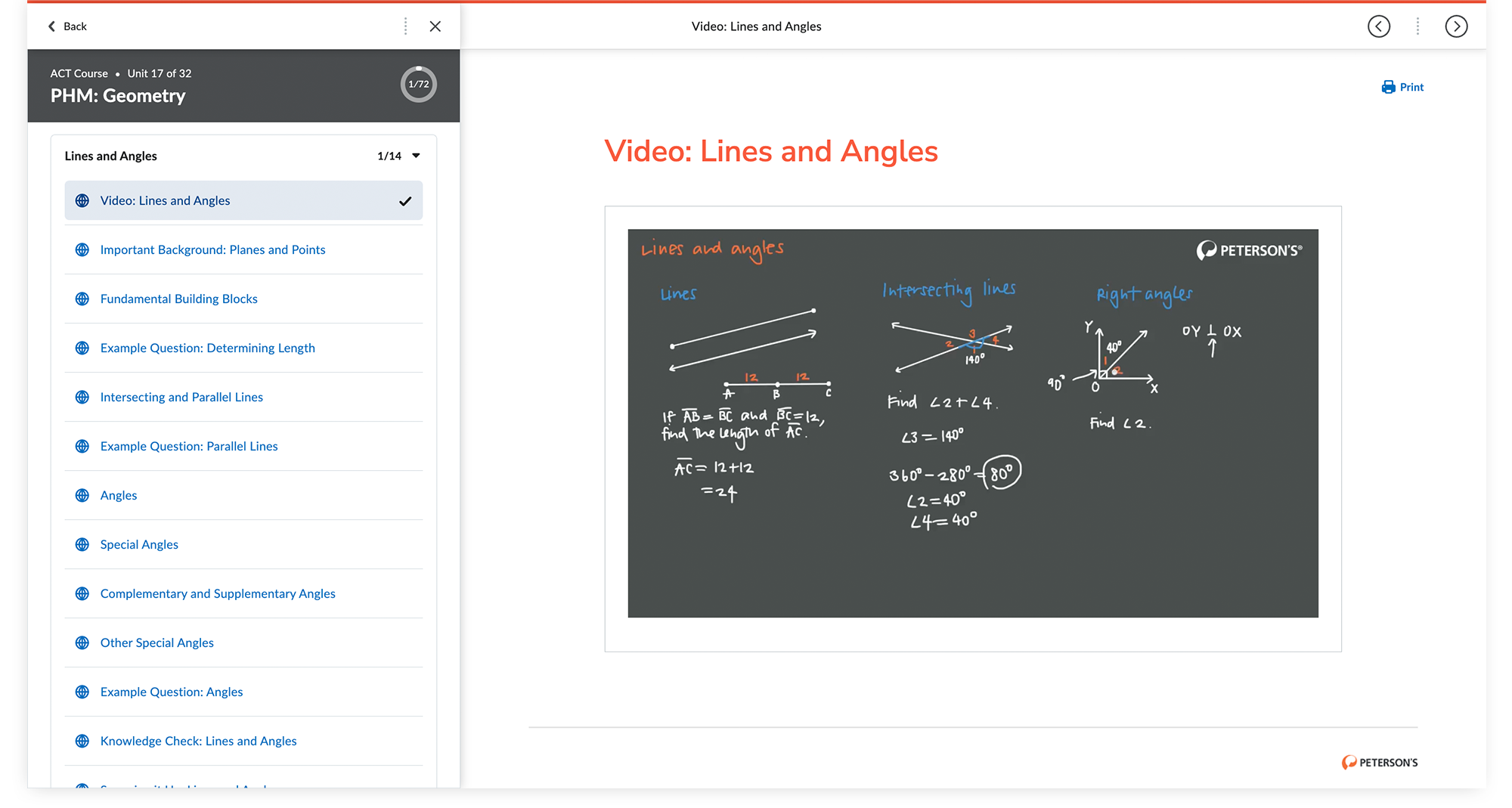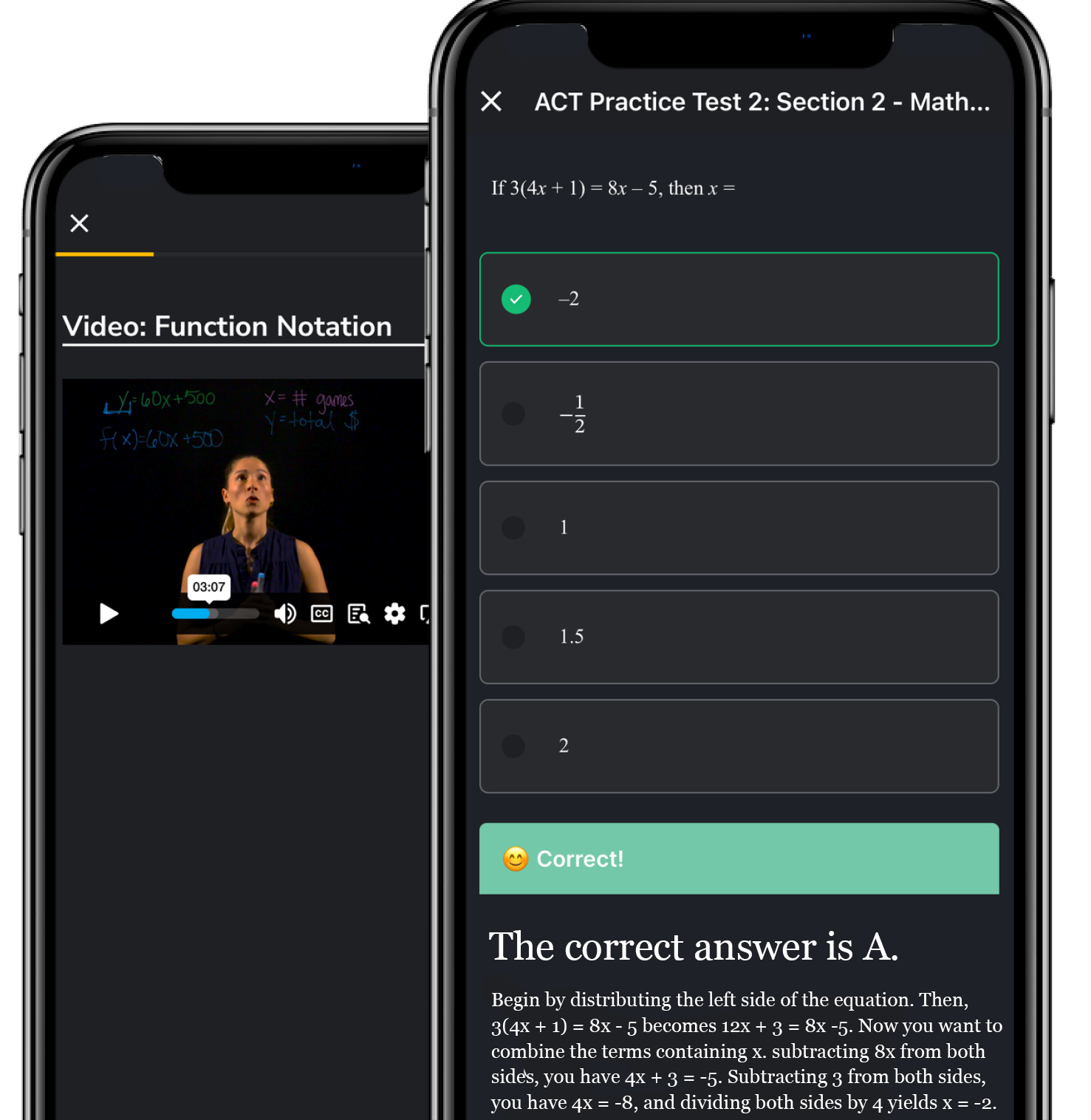SUCCESS STARTS HERE
ACT Test Prep Course
Peterson's college entrance test prep courses are designed to
boost students’ scores on the ACT exam and ensure their success
CONFIDENCE IS A BEAUTIFUL THING
An Easier Test Day
Peterson's college entrance test prep courses give you the tools, lessons, and practice tests you need so you can pass your exams with confidence and get accepted in to the college you want to go to.
Tools for Success
Transform test anxiety into confidence with proven tools and learning methods that will help you earn your highest score.
Instructional videos guide you through complex content so you can clearly understand the material on your ACT exam.
WHY STOP AT ONE?
Gain Unlimited Access
A Peterson's test prep subscription gives students unlimited access to over 200 courses so they can prepare for their exams in high school, college, and beyond.
DO YOU HAVE ANY QUESTIONS?
ACT FAQs
What is the ACT test?
The ACT test measures what a student has learned in high school and gauges an individual’s academic college readiness. Most colleges and universities require reported scores ACT, SAT, or other standardized tests to help make admissions decisions. High school curriculum and grading policies vary from state to state. Additionally, independent and parochial schools are exempt from federal and state standards. By having students all take the same test, admissions officers can better compare applicants within their cohort.
What is on the ACT test?
The ACT test is a multiple choice test containing four sections: English, Reading, Math, and Science. It also offers an optional essay section. You’ll be tested and assessed on the following for each section: English: assesses usage, mechanics, and rhetorical skills Math: measures your knowledge in pre-algebra, elementary algebra, intermediate algebra, coordinate geometry, plane geometry, and trigonometry Reading: passages that measure your ability to read closely, reason logically, and use information from multiple sources. Science: tests your knowledge of biology, chemistry, Earth and space sciences, and physics Essay: measures your writing skills about your position on a prompted issue Some colleges require the ACT essay, so make sure to check with the colleges to which you’re applying before deciding to opt out of the ACT essay.
How long is the ACT test?
The ACT test has 215 questions in which you’ll have 2 hours and 55 minutes to complete. This does not include the optional writing test which is 40 minutes long. Here’s a breakdown of how long you’ll have to complete each section of the ACT English – 45 minutes, 75 questions Math – 40 minutes, 60 questions Reading – 35 minutes, 40 questions Science – 35 minutes, 40 questions Writing – 40 minutes (optional exam, based on colleges and universities) Since you’ll have, on average, less than one minute to answer each question, it’s wise to take a few ACT practice tests to learn how to pace yourself before before the actual ACT test.
What are the ACT test dates and deadlines?
ACT test dates can be found on the ACT website. The ACT test is given multiple times per year on Saturdays (and some Sundays) in September, October, December, February, April, June, and July. Registration deadlines are often two to three weeks before the test date. Not all states have all testing dates available, and spots are limited for each date.
What is the best month to take the ACT?
The best month to take the ACT test is the month you feel prepared to take the exam. Regardless of the date you choose, register for the ACT test date that will give you adequate time to practice and prepare for test day. We recommend at least 4-6 weeks of proper preparation leading up to your ACT test.
How are ACT tests scored?
Each of the four sections of the ACT test are scored on a 1 to 36 point scale, a 36 being a perfect score. Your total ACT score is calculated based on the average of your four scores and is also on a 1 to 36 point scale. The writing test is scored separately.
What is a good ACT score
Generally, an ACT score of 24 or higher, or above the 75th percentile, is a good ACT score. With a score of 27, you will usually be within the commonly accepted range of selective colleges. Ivy League schools often require a score of 30 or higher.
Earning a good score on the ACT could save you a lot of money on college tuition. By taking the ACT test and performing well, you can increase your chance of scholarships opportunities.
What is the difference between SAT and ACT?
Both ACT and SAT tests help colleges determine admissions eligibility. Here are the main differences between the ACT and SAT test:
The ACT test includes a science section while the SAT test does not.
The SAT test includes some math questions where you are not allowed to use a calculator, whereas you can use a calculator for all math questions on the ACT test.
There is no essay on the SAT test while there is an optional essay on the ACT test.
Scoring for the SAT test uses a scaled score ranging from 400-1600. The ACT test is scored on a scale of 1-36.
How do I register for the ACT?
ACT test registration deadlines fall approximately 4 weeks before each test date. To register online for the ACT, visit the ACT website at www.act.org.
How many times can you take the ACT?
You can take the ACT test up to 12 times, although that isn’t recommended. Even though retaking the ACT test usually results in a higher score, taking the ACT test multiple times could potentially impact your college application in a negative way.
The best thing you can do is to prepare and earn a high score the first time you take the ACT test. ACT practice tests and study guides/lessons are two of the best ways you can get ready for the test. Our comprehensive online ACT prep course will help you go into your ACT test with confidence so you can earn your highest score possible.










